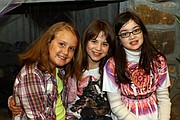KWOS Radio will celebrate 80 years of service Monday. The Jefferson City station traces its start back to the family who began the News Tribune.
"Robert C. Goshorn, the father of longtime News Tribune Publisher Betty Weldon, is responsible for the station we know now," KWOS Chief Engineer Steve Morse said. "There was no format. It was only on during the day. They signed on at 12:30 p.m. and went off at 5:30 p.m their first day on the air. They later went from 6 a.m. to sunset. The first license we found shows the Tribune as the owner. In their first year of operation, they lost $5,000. They were not selling lot of advertising, and back then, that was a lot of money. But they were able to survive."
The station stayed on until 10 p.m. starting in the late 1930s, and for many years, it was the only station on in Mid-Missouri until that hour. KWOS aired at 1310 KHz for a while on the AM dial, then went to 1340, and in 1941, it went to 1240. The station stayed there until 1999, when it went to its current home of 950, which is also simulcast now on 101.1 FM.
The station actually came on as a state-owned entity, and its call letters were WOS, which some said meant "Watching Our State."
"The station was shut down for a time, and Mr. Goshorn decided the community needed a radio station," Morse said. "Mr. Goshorn decided to have the call letters KWOS, which mean 'Keep Watching Our State.'"
Several well-known news people have worked at the station over the years.
Don Roberts, news director in the late 1960s until around 1980, had "a big, unmistakable voice," current News Director John Marsh said. Roberts covered city politics as well as the state.
Ted Street was a longtime program director and was followed by Jack Renner, who was at the station in the 1960s and '70s.
"My first time on the air at KWOS was as a kid doing high school reports in 1972," Marsh said. "The station then was located at the old bus station building that is now the News Tribune parking lot. I was shaking while I read, and Jack ran the control board."
Other owners and general managers included William "Buzzy" Natsch, Johnny Muesseig and Bob Kolb.
Morse said the newspaper created Capital Broadcasting in the 1940s and launched the second FM station in the state, 98.5 KWOS, in April 1948. It lasted about 10 years.
"KWOS played a huge role in getting what we now know as the St. Louis Cardinals radio network started," he said. "The station was one of a four-station group that carried the Cards well before KMOX even thought about getting involved."
The station carried Cardinals games in Jefferson City from 1938-2006, when broadcasts were moved to KAT Country, 94.3 FM, run by KWOS's current owner, the Zimmer Radio Group.
Marsh and Morse worked for the station when the studios were located next to the Missouri Bar on McCarty Street. The building is still standing and had been House Funeral Service before it was converted for use by the radio station.
"They still had a hand-cranked elevator that had been used to haul caskets in there," Marsh said. "The record library was where the embalming area was."
"In the late '70s, I did an evening jock shift, and we carried the CBS Mystery Theater," Marsh continued. "So one night I turned the lights out so the only lights on were on the control board. With this being an old funeral home, I'd been told you could see ghosts. This night, out of the corner of my eye, I saw something white go by. I peeked out of the studio and looked into the offices. Instead of a ghost, it was our sports guy, Bob Jackson, who had on a white dress shirt and was coming back in from a game. So that's the closest thing to a ghost story I have."
Morse did morning shifts and recalled a memorable day when the phone company had work to do at the station.
"At the time, all audio came down through phone lines," he said. "This morning, the audio cuts off, but the music stayed on. All of a sudden, we heard some cursing going over the air, and it was the engineer at our transmitter site, waiting on the phone company. So that went on the air, and there was no way we could cut it off. Some of the front office folks came running in, and I told them there we couldn't stop it. This went on for a few minutes, but it felt longer. Finally the phone company realized what was going on and made the switch. Our general manager was trying to get out to the transmitter to let our engineer know, but the switch happened while he was headed out there."
"As we look at the future, we're adapting with the changes brought about by social media," Marsh said. "We're not just a radio station. We'll keep watching our state."


